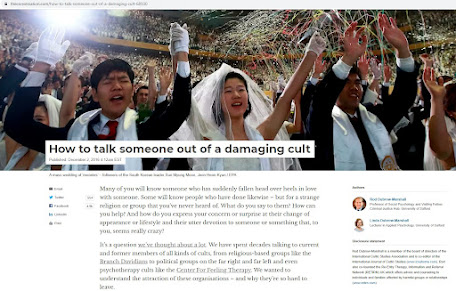How to talk someone out of a damaging cult
When what seems like the most loving group of individuals with the best ideas ever turns out to be a really big mistake, it is very hard and sometimes humiliating for cult members to admit to the outside world that they were wrong.
10 Things to Know About the Psychology of Cults
Cults are attractive because they promote an illusion of comfort.
Cults satisfy the human desire for absolute answers.
Those with low self-esteem are more likely to be persuaded by a cult environment.
New recruits are “love bombed.”
Cults maintain their power by promoting an “us vs. them” mentality.
Cult leaders are masters at mind control.
Cult members often have no idea they’re in a cult.
1. Opposing critical thinking
2. Isolating members and penalizing them for leaving
3. Emphasizing special doctrines outside law or science
4. Seeking inappropriate loyalty to their leaders
5. Dishonoring the family unit
6. Crossing boundaries of behavior
7. Separation from other organizations
How to talk someone out of a damaging cult
This is where you come in again: be there as the unconditionally loving and caring friend or family member that you really are.
Where the cult judges and condemns its members, you will be there as the person who says: Sure, it is a crazy destructive group, but I understand why you got involved. We all fall for con artists and swindlers once in a while – you still have a lot to offer and I can help you move on with your life.

No comments:
Post a Comment